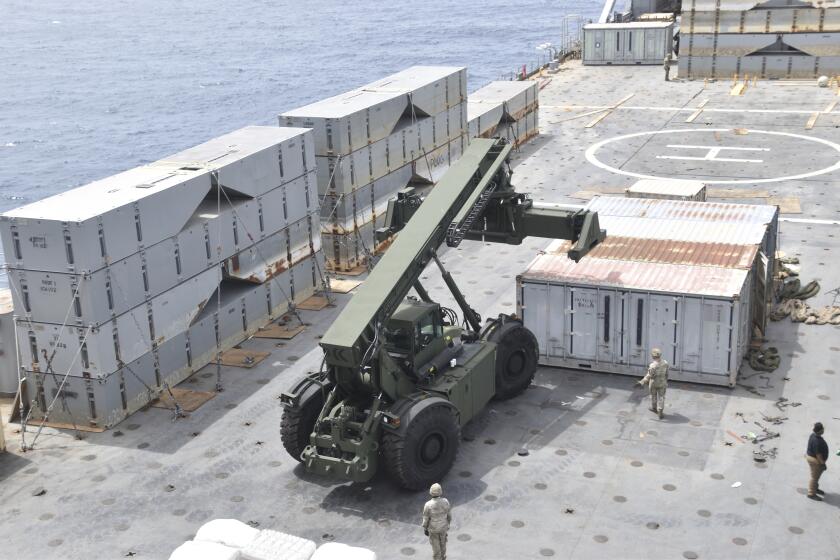He sought a new role for Pentagon
Donald H. Rumsfeld came to the job of Defense secretary determined not only to remake the U.S. military, but to recast the Pentagon’s role in national security.
He arrived with a prescription for what he believed ailed the Pentagon. As he later put it in one of his famous “snowflake” memos -- so named by staffers because they arrived in a constant blizzard -- the department was “tangled in its anchor chain.” Rumsfeld saw the military as paralyzed by old thinking, outdated policies, service rivalries and a love of slow-moving tanks and aircraft carriers.
The Pentagon, State Department, National Security Council and intelligence community have always jockeyed for influence. But in the Bush Cabinet, Rumsfeld -- in part through the force of his personality -- established himself and his department as the first among equals, coming to dominate national security policy more thoroughly than any figure since Henry Kissinger.
“He was the Olympic athlete of interagency ruthless bureaucrats,” said retired Army Gen. Barry McCaffrey. “He was charming, determined and absolutely brutal to those who opposed his ideas.”
Rumsfeld’s insistence that the Pentagon take the lead left him with responsibility for the course of the war in Iraq. And after a stunning repudiation by voters of the administration’s policy on the war, Rumsfeld is leaving at what is arguably a low point in the U.S. effort.
President Bush’s new Defense nominee, Robert M. Gates, is likely to be the first member of an entirely new team on Iraq. Senior State Department officials have said in recent days that Zalmay Khalilzad, the U.S. ambassador to Iraq, also is expected to resign. And senior Army officials have said they expect Army Gen. George W. Casey Jr., the top American commander in Iraq, to leave his post by early next year.
Bush said Wednesday that he had come to the conclusion before the election that a new Defense secretary was needed.
“Secretary Rumsfeld and I agreed that sometimes it’s necessary to have a fresh perspective,” he said.
As a result, the Pentagon chief known for lightning-rod comments about the Iraq conflict -- such as his observation in 2004 that “you go to war with the Army you have, not the Army you might want or wish to have” -- stepped down Wednesday.
According to two associates, Rumsfeld had wanted to serve as Defense chief as long as he could get things done. With criticism of the president’s Iraq policy mounting and the U.S. prospects in the war worsening, he concluded he could no longer be effective.
“He came to accept that the scales had tipped the other way,” said an associate who spoke on condition of anonymity to avoid any appearance of violating a confidence.
In brief remarks at the White House, Rumsfeld alluded to the rising criticism of the war of which he was a prime architect. Quoting Winston Churchill, he said, “I have benefited greatly from criticism, and at no time have I suffered a lack thereof.”
After the 2001 invasion of Afghanistan, led primarily by special operations forces and CIA paramilitary fighters, Rumsfeld emerged with a reputation as a decisive leader. The seemingly successful invasion of Iraq in 2003 further burnished that image.
But public perception of Rumsfeld began to change as the war in Iraq dragged on and American casualties mounted. Critics charged that he had ignored or downplayed the insurgency until it was too late and Iraq had descended into sectarian conflict.
His six years under Bush were Rumsfeld’s second tour in the job. He was Pentagon chief for a little over a year in the Ford administration. If he remains in office until Dec. 29, he will best the record of Robert S. McNamara, who oversaw the Vietnam War and served for more than seven years.
Rumsfeld exerted huge influence in the Pentagon because he mastered both the sweeping, revolutionary ideas that so enamored Bush as well as the sometimes arcane bureaucratic fine points on which Washington runs.
“He had such an influence on the department, by the sheer force of his personality.... His rule and dictates drilled way down into the bureaucracy in the Pentagon,” said James J. Townsend Jr., a civilian Pentagon official who helped direct North Atlantic Treaty Organization policy before retiring last month.
Though Townsend acknowledged that Rumsfeld is likely to be judged first by the Iraq war, he added that it is important to acknowledge that the secretary changed how the Defense Department does business.
“He really did go in with a broom and shake out a lot of cobwebs and force people to think differently,” said Townsend, now the international security program director at the Atlantic Council, a Washington organization that supports NATO projects.
It is hard to imagine a more controversial leader within the department. Few in the Pentagon were ambivalent Wednesday about Rumsfeld’s leadership.
His many supporters credit him with making tough decisions, speeding up the transformation of the military, cutting outdated weapons systems, advancing the missile defense system, creating a new focus on domestic security, repositioning forces out of Germany and South Korea, and reorganizing the Army to make it more adaptable.
But critics shook their heads in dismay as he considered cutting the Army by two divisions early in his tenure. They also charge that he allowed strong-willed deputies to drop the military’s adherence to the baseline standards of the Geneva Convention and created a military prison at Guantanamo Bay beyond the reach of American courts.
The critics said he equated long experience with antiquated thinking, and ran roughshod over people who offered alternate ideas. To these critics, the difficulties of the Iraq war are the natural result of Rumsfeld’s tendency to ignore the warnings of others.
Lawrence DiRita, a former advisor to Rumsfeld, disputed the criticism and argued that his former boss accelerated the military’s move toward a more nimble and faster-moving force.
“Adversaries around the world understand how much more capable we are today,” DiRita said. “There has been a paradigm shift at the Department of Defense toward speed, agility and precision.”
DiRita said Rumsfeld is not to blame for the problems in Iraq.
“I think it would be counter-factual for people to conclude that but for Don Rumsfeld, things in Iraq would be very different,” he said.
But many believe that the setbacks in the war have much to do with Rumsfeld’s insistence on a small invasion force and his early dismissal of the idea that the U.S. military has a duty to help rebuild nations.
McCaffrey, a Rumsfeld critic, said the outgoing secretary was blinded by his view that the military was antiquated and by his decision not to listen to military experts.
“This very determined man managed, through arrogance and misjudgment, to put the country’s armed forces in a strategically perilous position,” McCaffrey said. “He thought we were a colossal group of lower-class minds rooted in World War II, and he was going to help us to understand the nature of warfare.”
Rumsfeld’s supporters argue that his emphasis on precision strikes and the power of expeditionary forces will have the most lasting impact.
But other officers believe Rumsfeld’s transformation of the military will be overshadowed by the experience in Iraq, a war that stands to profoundly reshape America’s armed forces in other ways.
*
Times staff writers Doyle McManus and Paul Richter contributed to this report.
*
(BEGIN TEXT OF INFOBOX)
Donald H. Rumsfeld
Key moments in Rumsfeld’s tenure:
Dec. 28, 2000: President-elect Bush unexpectedly nominates Donald H. Rumsfeld, who was Defense secretary under President Ford, to return to the position.
Jan. 20, 2001: Rumsfeld, 69, becomes the oldest person ever to be sworn in as Defense secretary.
Sept. 11, 2001: Rumsfeld is in his Pentagon office when one of four planes hijacked by terrorists hits the building. He helps load casualties onto stretchers before joining aides in the National Military Command Center.
Oct. 7, 2001: In response to the Sept. 11 attacks, the United States launches strikes on the Taliban regime in Afghanistan.
Jan. 31, 2002: Rumsfeld outlines guidelines for preemptive military actions, to be known as the Bush Doctrine, saying terrorist threats may require “we take the war to the enemy.”
March 20, 2003: The U.S.-led war against Iraq begins.
March 30, 2003: Asked about weapons of mass destruction in Iraq, Rumsfeld says, “We know where they are.”
April 30, 2003: Rumsfeld makes a triumphal visit to Iraq, hailing what he calls its liberation from a “brutal, vicious regime.”
May 7, 2004: After the release of photographs showing sexual and physical abuse of prisoners at the U.S.-run Abu Ghraib prison in Iraq, Rumsfeld apologizes to Congress and to victims. “I take full responsibility,” he says.
Feb. 3, 2005: Rumsfeld reveals that he twice offered Bush his resignation during the height of the Abu Ghraib scandal and that the president would not accept it.
April 2006: Eight retired U.S. generals, critical of the war in Iraq, call for Rumsfeld’s resignation.
Nov. 8, 2006: Rumsfeld resigns.
*
Times research by Scott J. Wilson
More to Read
Start your day right
Sign up for Essential California for news, features and recommendations from the L.A. Times and beyond in your inbox six days a week.
You may occasionally receive promotional content from the Los Angeles Times.






